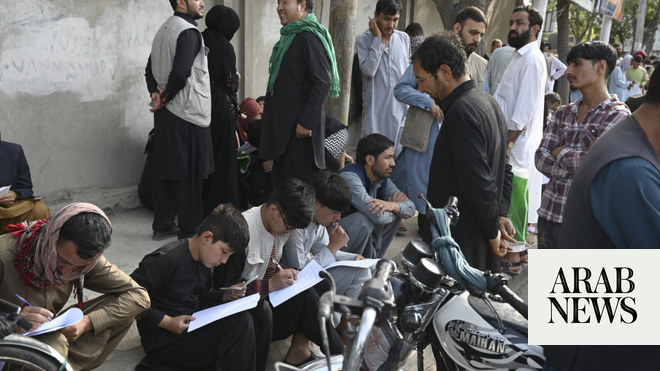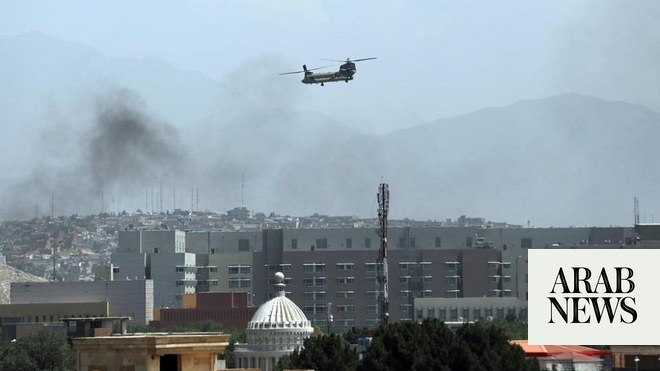
s the Taliban started searching their neighbourhood, Abdul and his wife began to hide with different relatives across Kabul. One night they narrowly escaped, fleeing through a back door. Abdul is still carrying the job records and ID documents that could be their only ticket out. But if the Taliban find them first, those same papers could prove a death sentence.
Talking yesterday via a patchy WhatsApp connection, Abdul told me how he’s been on the run on and off ever since 2012, when he last worked as an interpreter for the British army in Helmand. His was the most dangerous, visible job: scanning locations for traps and other dangers before heavily armoured British troops moved in. Eventually, after threats from distant Taliban relatives, he fled.
An evacuation control checkpoint at Hamid Karzai international airport, Kabul, Afghanistan on Wednesday.
UK nationals of Afghan origin being overlooked in Kabul airlift, claim lawyers
Read more
Thanks to years of pressure from journalists, lawyers and Afghan campaigners to secure asylum for interpreters, Abdul’s service record should now make him fully eligible for relocation in the UK. Yet this month, after years of delays and confusion – and just as the Taliban moved into Kabul – he got an inexplicable rejection from the Home Office. The reason, he can only speculate: perhaps it’s that he’s distantly related to senior Taliban figures. Which is precisely why he’s trying to flee.
There are some who have been more fortunate. Ahmad, who worked as a translator for nine years, successfully appealed against his asylum rejection and the Home Office finally cleared him for relocation. However, when he turned up at Kabul airport with his wife and three children, a British soldier told him his documents were fake, and turned him away. His youngest, a baby, got ill in the interminable queue; he wanted to take her back home so she didn’t deteriorate further. Yet their only chance of getting out is for them all to hunker down at the airport, fighting the desperate crowds gathered there, hoping that a Home Office reconfirmation comes through in time – or that, arbitrarily, another British soldier takes a different view. As warnings come in of a planned terrorist attack on the airport, the situation is becoming increasingly perilous.
In recent days, UK government press briefings have tried to spin a tale of valiant British rescue efforts. Boris Johnson, according to Downing Street, led the G7 in its (failed) appeal to President Biden to postpone the US departure deadline, so that more people could be airlifted. Dominic Raab, describing the UK as a “big hearted nation”, has promised a “bespoke resettlement scheme” for Afghan refugees and a likely 10% increase in aid in the coming year. Announcing sweeping extensions to Britain’s Afghan relocations and assistance policy (Arap), Ben Wallace and Priti Patel talked of their abiding commitment to “honour the risks and sacrifices that brave Afghans made to support this country”.
Yet as the clock ticks down to 31 August, the facts and the numbers just don’t add up. For decades, Britain’s failure to protect even its closest partners and allies in Afghanistan have been repeatedly laid bare. The plight of Afghan interpreters is hardly new: eight years ago, I worked with the campaign group Avaaz, lawyers at Leigh Day and senior British military figures to raise the alarm about their summary torture and killing.
Raab’s pledged 10% aid increase comes on the heels of a savage 78% cut announced earlier this year. Even before the Taliban took control, British aid cuts had severed vital lifelines to Afghan women: forcing Afghanaid, for example, to end a project helping 10,500 women in rural Afghanistan. (How any aid will be distributed at all, now the country is in the hands of the Taliban, is another question.)
And while Wallace and Patel spoke this month of their “huge debt of gratitude” to interpreters and other Afghan partners, networks such as the Sulha Alliance point out that many thousands of eligible evacuees are still missing from official government figures, with days or even hours left to close the gap. Advocacy and legal groups are still reporting countless cases of interpreters being (wrongly) told they are not eligible because they were sub-contractors, or were fired for minor administrative breaches, or because they are deemed a “security risk” – despite having already passed vetting to work with British soldiers on the battlefield, many risking their lives for years.
In the chaos of war, mistakes will always be made. Becoming emotional when speaking to LBC radio this month, Wallace admitted that, while all efforts were being deployed, “some people won’t get back”. But to frame these as tragic, isolated cases – prey to a tactical misjudgment about the speed of the Taliban advance – is delusional.
Partners and Nato allies on the ground have for months been begging embassies, NGOs and anyone else they can to evacuate them. At the 11th hour, senior diplomats and some women’s rights advocates called, in vain, for airstrikes and other military interventions to secure Kabul. Meanwhile, others argued, pointing to the past 20 years, that there was never a feminist case for western military intervention.
Abdul’s WhatsApp is full of stories of colleagues who have been tortured or executed, or who are still in hiding. Speaking to me from Kabul yesterday, his voice cracked as he asked: “We really served you, honestly and loyally. We never turned our backs on you. We were there when you were in danger, when you died in Helmand, we died with you in Helmand. Why are you leaving us behind?”
As we witness a 20-year effort to build peace, security and establish basic human rights end in yet more bloodshed and failure, we should be asking ourselves hard questions about what “armed missionaries”, to use Robespierre’s phrase, can ever achieve. And what price those they claim to serve, protect, or emancipate will ultimately be forced to pay.
Ahmad and Abdul’s real names have not been given to protect them
Mary Fitzgerald is director of information democracy at the Open Society Foundations and former editor-in-chief of openDemocracy. She writes here in a personal capacity
The fall of Afghanistan: join a Guardian Live online event with our journalists Emma Graham-Harrison, Peter Beaumont and Julian Borger analysing the latest developments. Monday 6 September at 7pm BST. Book your tickets here. All profits will be donated to relevant charities.












